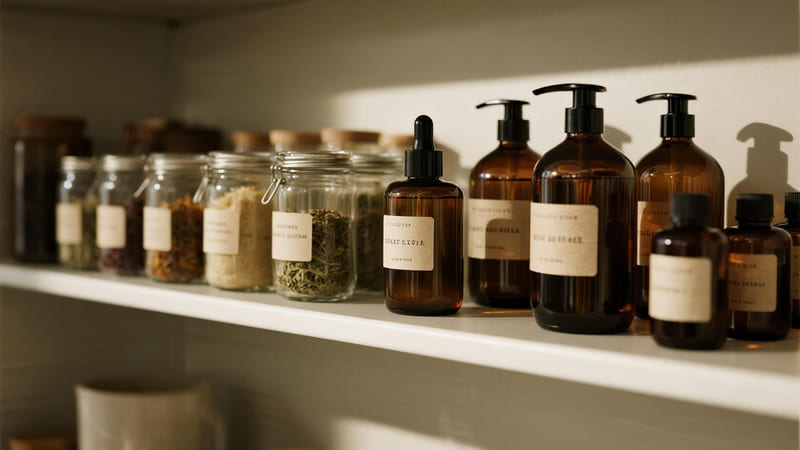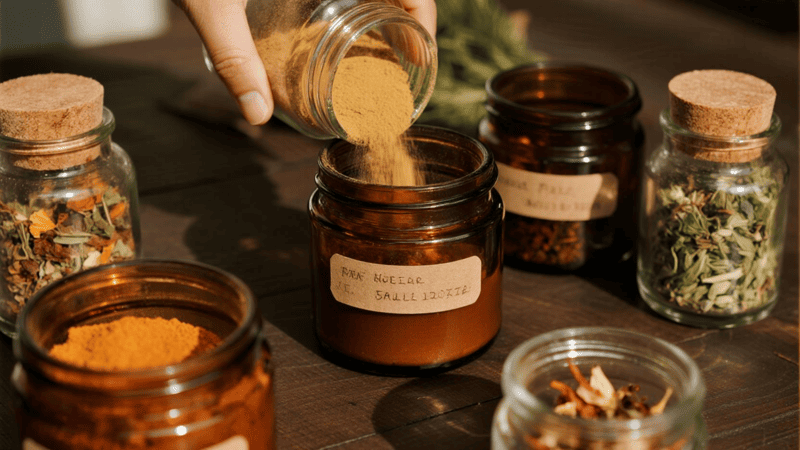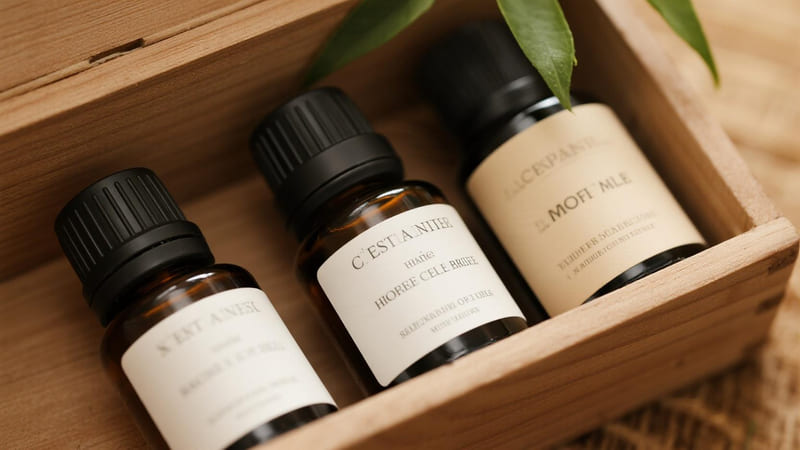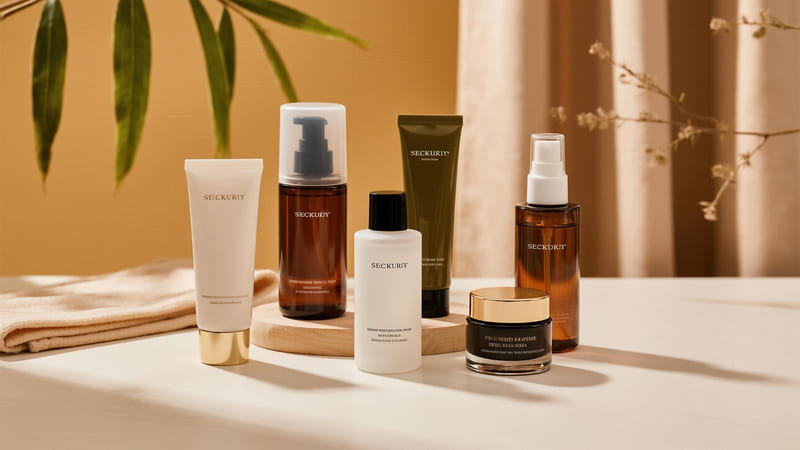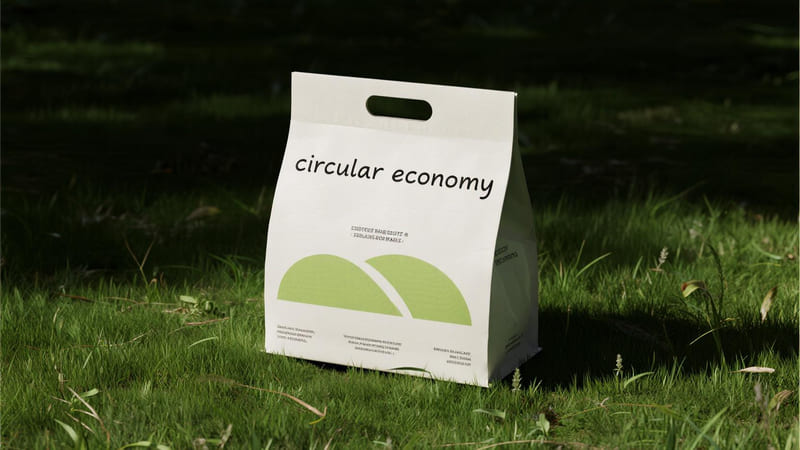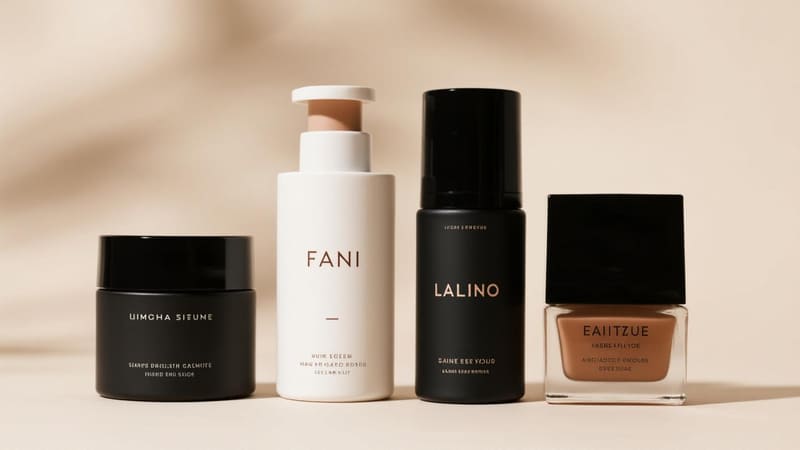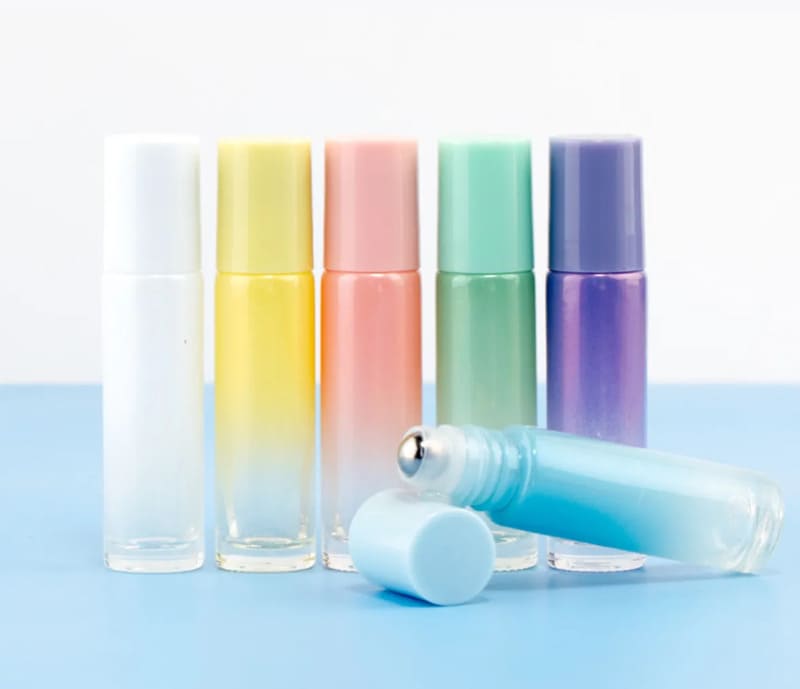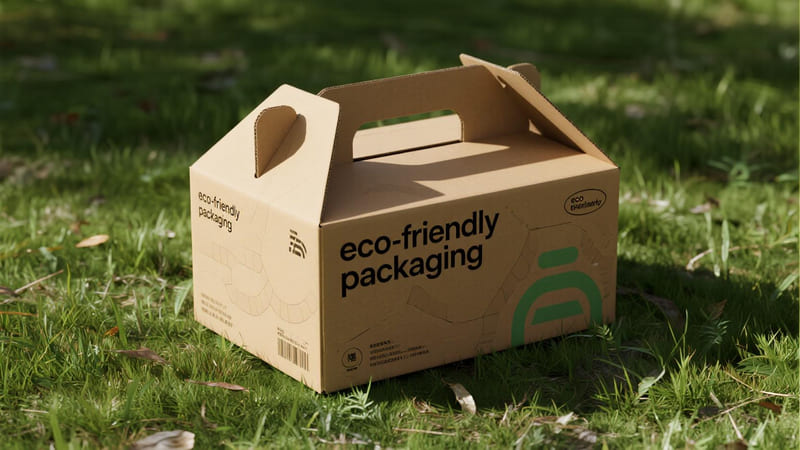For any herbalist, from the budding home enthusiast to the seasoned professional, proper storage of your precious ingredients is paramount. The delicate chemical constituents that give herbs and essential oils their therapeutic and aromatic properties are vulnerable to degradation. Proper storage is the key to preserving their potency, freshness, and shelf life.
To store herbalist ingredients and essential oils correctly, keep them away from their primary enemies: heat, light, air, and moisture. Store dried herbs in airtight, labeled glass jars in a cool, dark cupboard. Store essential oils in tightly sealed, dark-colored (amber or cobalt) glass bottles, also in a cool, stable temperature environment.
The principles of good storage are simple but crucial. As a packaging expert with ShineTop, I understand that the right container is the first and most important line of defense for preserving the integrity of sensitive contents, whether they are cosmetics or botanical ingredients. Let’s break down the best practices for storing your herbal treasures.
How to Store Dried Herbs, Powders, and Teas?
Dried herbs, while more stable than fresh, can still lose their color, aroma, and potency if not stored correctly. The goal is to protect them from the elements that cause them to degrade.
Store dried herbs, powders, and teas in airtight glass jars, preferably amber or other dark-colored glass to block light. Keep the jars in a cool, dark, and dry place like a cupboard or pantry, away from the stove or sunny windows. Label each jar clearly with the herb’s name and the date of storage.
Best Practices for Storing Dried Herbs:
-
Choose the Right Container:
- Airtight is Key: Use containers with a tight-fitting lid to keep air and moisture out. Air causes oxidation, and moisture can lead to mold.
- Glass is Best: Glass is non-porous and inert, meaning it won’t absorb odors or flavors from the herbs, nor will it leach any chemicals. Mason jars or glass jars with gasket seals are excellent.
- Dark-Colored Glass is Ideal: Amber or cobalt blue glass provides the best protection from light, which can fade the herbs and degrade their volatile oils. If you only have clear glass jars, be extra diligent about storing them in a completely dark cupboard.
- Avoid Plastic Bags/Containers (for long-term): Plastic can be porous and may leach chemicals or absorb the herb’s aroma. Thin plastic bags offer no protection from light or crushing.
- Avoid Metal (unless stainless steel): Some metals can react with herbs. Food-grade stainless steel tins are an acceptable alternative to glass.
-
Find the Right Location:
- Cool: Heat is a major enemy, causing volatile oils to evaporate and potency to decline. Avoid storing herbs above your stove, near a radiator, or in a hot attic. A cool pantry or cupboard is perfect.
- Dark: Light, especially direct sunlight, will rapidly degrade the color, flavor, and medicinal properties of your herbs.
- Dry: Humidity and moisture are the biggest risks for mold growth. Never store herbs in a damp basement or right next to the sink.
-
Proper Preparation & Labeling:
- Ensure Herbs are Completely Dry: Before storing, make sure your herbs are "crispy" dry. Any residual moisture will lead to mold.
- Store Whole if Possible: Herbs stored whole (e.g., leaves, seeds, roots) retain their potency longer than those that are powdered. Grind them as needed.
- Label Everything: Clearly label each jar with the common name, botanical name (if you know it), and the date you stored it. This helps with identification and tracking freshness. Most dried leafy herbs are best used within a year.
How to Store Essential Oils?
Essential oils are highly concentrated and volatile liquids. Their storage requirements are even more stringent than those for dried herbs to prevent them from oxidizing and losing their therapeutic value.
Store essential oils in dark-colored (amber or cobalt blue) glass bottles with tightly sealed caps. Keep them in a cool, stable temperature environment, away from all sources of heat and direct sunlight. Storing them upright in a dedicated wooden box or a cool, dark cabinet is ideal.
Best Practices for Storing Essential Oils:
-
The Right Bottle is Non-Negotiable:
- Dark Glass: As with herbs, amber or cobalt blue glass is essential to protect the oils from UV light degradation. This is why you will never see a reputable essential oil sold in a clear glass bottle.
- Glass Only: Pure essential oils can degrade or even dissolve plastic, so they must always be stored in glass.
- Airtight Seal: The cap must be screwed on tightly after every use to prevent oxygen from entering the bottle. Oxidation is the primary way essential oils "go bad."
-
The Right Environment:
- Cool & Stable Temperature: Heat accelerates oxidation. Avoid storing oils in a hot car, on a sunny windowsill, or in a steamy bathroom. A cool closet or a dedicated storage box is best. For very precious or fragile oils (like citrus), refrigeration can significantly extend their shelf life.
- Darkness: Even in a dark bottle, it’s best to provide an extra layer of protection from light by storing them in a box, drawer, or cupboard.
- Safety: Always store essential oils out of reach of children and pets.
-
Minimize Headspace:
- The more empty space (headspace) in a bottle, the more oxygen is available to degrade the oil.
- If you have a large bottle of a precious oil that you are using slowly, consider decanting it into smaller bottles as you use it up to reduce the amount of air it’s exposed to.
How to Store Tinctures, Infused Oils, and Salves?
Herbal preparations like tinctures, infused oils, and salves also require proper storage to maintain their freshness and efficacy.
Store tinctures and infused oils in dark-colored, airtight glass bottles in a cool, dark place. Salves and balms should be stored in airtight, clean jars (glass, metal, or ceramic) in a cool environment to prevent them from melting or becoming rancid. Proper labeling with ingredients and date is crucial for all preparations.
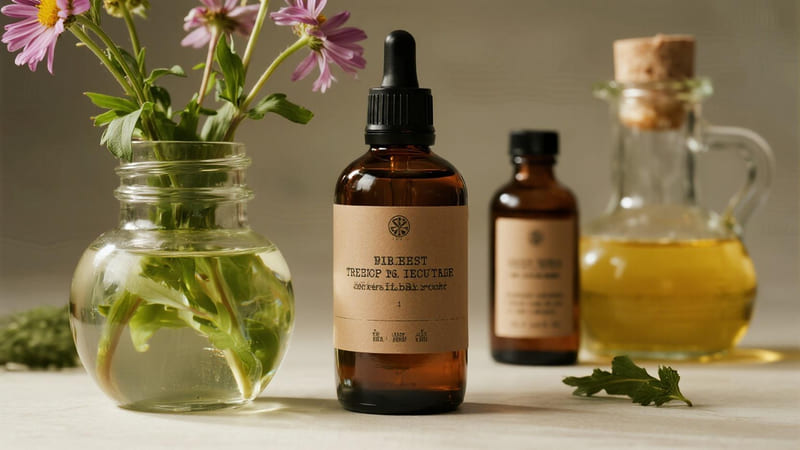
Storage for Herbal Preparations:
-
Tinctures (Alcohol-Based Extracts):
- Container: Always use dark glass bottles (amber or cobalt) with a tight-fitting lid or dropper top. Alcohol can react with some plastics and metals.
- Location: A cool, dark cupboard is perfect.
- Shelf Life: Tinctures are very stable due to the alcohol preservative. When stored properly, they can last for many years (often 5+).
-
Infused Oils (Herbs infused in a carrier oil):
- Container: Dark glass bottles are best to protect the oil from light, which can cause rancidity.
- Location: A cool, dark place is essential. Some herbalists recommend refrigerating infused oils to prolong their life, especially if they are made with less stable carrier oils.
- Shelf Life: The shelf life is determined by the carrier oil used. It can range from a few months to a year or more. Always smell your infused oil before use; if it smells "off" or like stale crayons, it has gone rancid.
-
Salves, Balms, and Herbal Creams:
- Container: Use clean, sterilized, airtight jars. Dark glass is ideal, but metal tins (aluminum or tinplate) or ceramic jars also work well.
- Location: A cool, dark place is crucial. Heat will cause salves and balms (made with oils and waxes) to melt.
- Shelf Life: Typically 6 months to a year, depending on the ingredients and whether a natural preservative (like Vitamin E oil or rosemary antioxidant) was used.
Why is Proper Storage So Important for Herbal Ingredients?
Proper storage is not just about keeping your apothecary tidy; it’s about preserving the very essence of what makes the herbs and oils effective.
Proper storage is important for herbal ingredients to: 1. Preserve Potency (maintaining the active chemical constituents). 2. Prevent Spoilage (protecting from mold, bacteria, and rancidity). 3. Extend Shelf Life (saving money and resources). 4. Ensure Safety (preventing degradation that can create skin-sensitizing compounds). 5. Maintain Aroma and Flavor.
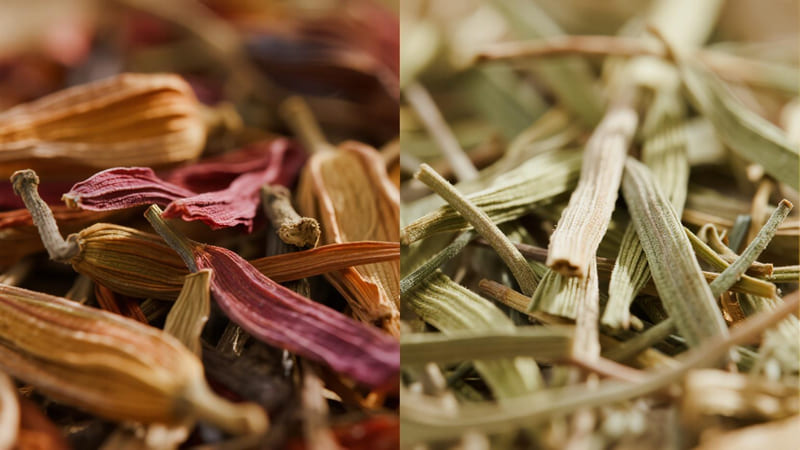
In short, improper storage leads to:
- Loss of Volatile Oils: The aromatic compounds that provide scent and many therapeutic benefits evaporate.
- Oxidation: The chemical breakdown of the plant’s constituents, especially in oils, leading to rancidity and loss of efficacy.
- Photodegradation: Breakdown caused by exposure to light.
- Mold & Bacterial Growth: Caused by moisture.
By investing in good quality storage containers, like the amber glass jars and bottles we often discuss with our natural beauty clients at ShineTop (like Anna from Thailand), and by being mindful of the storage environment, you are ensuring that the time, effort, and resources that went into growing, harvesting, and processing these botanical ingredients are not wasted.
Conclusion
The key to storing all your herbalist ingredients—from dried herbs and powders to potent essential oils and handmade preparations—can be summarized in four simple rules: Keep them Cool, Dark, Airtight, and Dry. By choosing the right containers (primarily dark, airtight glass) and the right location (away from heat, light, and moisture), you will effectively preserve the potency, freshness, and safety of your botanical treasures, ensuring they are ready and effective when you need them.

